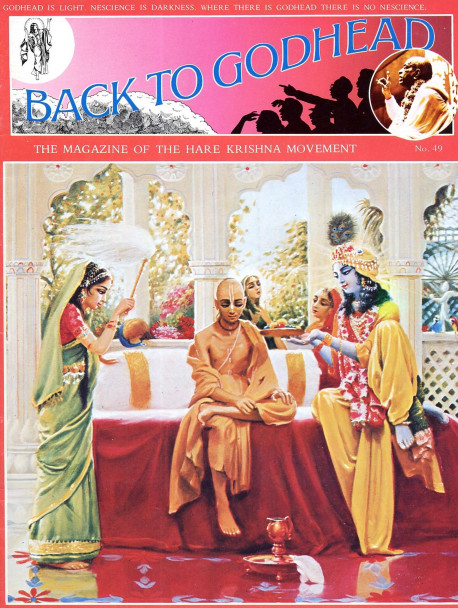
His Holiness Satsvarupa dasa adhikari Gosvami
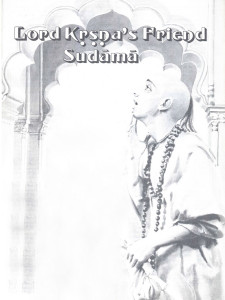 The wonderful history of Krsna and His friend Sudama is told in its entirety in the Krsna Book, Volume II, by His Divine Grace A.C. Bhaktivedanta Swami Prabhupada. Srila Prabhupada is kindly presenting to the western world the pastimes of Lord Krsna, which can act as a merciful shower upon the hearts of all of us. It is true that we have forgotten our eternal, blissful and loving relationships as servants of Krsna or God. The remedy to forgetfulness or ignorance of God is to hear about Him from the lips of His pure devotee. This is the view of authorized scriptures.
The wonderful history of Krsna and His friend Sudama is told in its entirety in the Krsna Book, Volume II, by His Divine Grace A.C. Bhaktivedanta Swami Prabhupada. Srila Prabhupada is kindly presenting to the western world the pastimes of Lord Krsna, which can act as a merciful shower upon the hearts of all of us. It is true that we have forgotten our eternal, blissful and loving relationships as servants of Krsna or God. The remedy to forgetfulness or ignorance of God is to hear about Him from the lips of His pure devotee. This is the view of authorized scriptures.
When Krsna descends from His eternal abode in the spiritual world and appears to this mundane world, as He did 5,000 years ago, He engages with others just as if He were an ordinary human being. Although He is unborn, He appears to have a mother and father. In the village of Vrndavana Krsna plays as a cowherd boy. He enacts these pastimes for His own transcendental pleasure and to attract all the suffering living entities back home, back to Godhead. Sudama was among those devotees who were childhood friends with Krsna, and Sudama was also His intimate school friend.
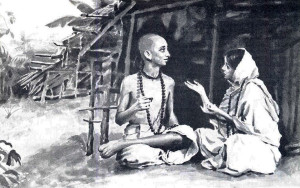 Krsna left Vrndavana at sixteen, and later He married and went to live as King of Dvaraka. Meanwhile Sudama was living as a brahmana, which means one who knows that the real self is spirit and who dedicates his life to being a spiritual guide for the whole society.
Krsna left Vrndavana at sixteen, and later He married and went to live as King of Dvaraka. Meanwhile Sudama was living as a brahmana, which means one who knows that the real self is spirit and who dedicates his life to being a spiritual guide for the whole society.
One cannot properly be called a brahmana simply because he is born the son of a brahmana; rather, there are qualities which one has to show before he can rightly be considered a brahmana. Such qualities are peacefulness, austerity, piety, knowledge and wisdom.
Sudama was also a householder, but he was not busy in accumulating wealth for very comfortable living. Whatever income came to him without difficulty, he accepted. He engaged his time in the service of the Supreme Personality of Godhead and thus showed himself to be perfect in knowledge. Externally Sudama appeared very poor because he had no rich attire and could not provide rich clothing for his wife. In fact they were not even eating sufficiently, and they were both very thin.
Often Sudama’s wife used to address her husband, “My dear lord, I know that Lord Krsna, the Supreme Lord of all the universes, is your personal friend. You are also a devotee of the Lord, and He is always ready to help His devotee. Moreover, Lord Krsna is always in favor of the brahmanas. Krsna is your friend, and persons like you have no other shelter but Krsna. You are saintly, learned and in control of your senses. Please, therefore, go to Him in Dvaraka. I am sure that He will understand your impoverished condition.
“You are a married man, so for you to be without money means to be in a distressed condition. As soon as Krsna sees your impoverished condition He will give you sufficient riches. Krsna is known to give even His own Self to one who is His pure devotee, so there would be nothing wonderful in His giving you some material riches. He will not hesitate to award you some material benefit for the bare necessities of life.”
Although the brahmana’s wife was not speaking out of anxiety for her own personal condition (she was, after all, dedicated to her husband, and she treasured his saintly values far above material riches), she nevertheless felt concerned that her husband, who was so pious, was living below the minimum standards for proper physical maintenance. As a good wife, she did not like to dictate to her husband, yet on repeated occasions she would speak to Sudama in this way, suggesting that he go to the capital city, Dvaraka, to see the Supreme Lord there.
Sudama, however, thought there to be no need to ask material benefit from Lord Krsna. But one time when she made this request, Sudama thought, “If I do go there, I shall be able to see the Lord personally. That will be a great opportunity, even if I don’t ask any material benefit from Him.” So he told his wife that he would go and that she should at once prepare some foodstuff that he could offer as a presentation to his friend.
Sudama’s wife had nothing in the house, but she went out and collected some chipped rice, which is the lowest grade of rice, from her neighbors, and she tied it up in a handkerchief. Sudama took the presentation and started at once toward Dvaraka. As a devotee, he was always thinking of Krsna, and now he became absorbed in the thought that he would soon be able to see the Lord.
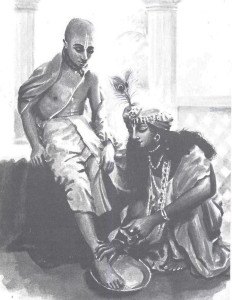 The Dvaraka palace where Krsna lived was not accessible to anyone and everyone, for it was a king’s palace and was guarded all around. Saintly persons, however, were allowed to enter, and Sudama passed through three military camps and many gates until he finally entered the residential quarters of Krsna.
The Dvaraka palace where Krsna lived was not accessible to anyone and everyone, for it was a king’s palace and was guarded all around. Saintly persons, however, were allowed to enter, and Sudama passed through three military camps and many gates until he finally entered the residential quarters of Krsna.
At that time Lord Krsna was sitting with His Queen Rukmini, but when He saw His friend Sudama coming, the Lord got up and went forward to receive him, and He embraced him feelingly. This behavior of Krsna toward His friend shocked the women attendants of the palace.
“But we thought Lord Krsna only embraced His Queen Rukmini and His brother Balarama,” they said among themselves. “Who is this poor brahmana? He is not even clean, and he is so skinny, yet Lord Krsna has embraced him in His two arms, and now He is washing the brahmana’s feet.”
Krsna, the source of all life, comes to this mortal world to enact His pastimes as a human being. He is actually the supreme pure, yet He sprinkled the water used to wash the brahmana’s feet on His own head, as if for purification. He welcomed the brahmana in many ways, giving him food and drink and saying, “My dear friend, it is great fortune that you have come here.”
Seating Sudama on His own cushioned bed, Krsna said, “My dear friend, you are most intelligent and know very well the principles of religious life. I know that after you finished your education at the house of our spiritual master you went back to your home and accepted a suitable wife. I know very well that from the very beginning you were never attached to the materialistic way of life, nor did you desire to be very opulent materially.”
Krsna then began to remember their days together when they were both entrusted to the guidance of the same spiritual master. They were school friends living at the same house. Krsna very highly praised those days and said, “Whatever knowledge we have received in our lives was accumulated in those days.” So important is the instruction received from a bona fide spiritual master that Krsna, who is God Himself, and thus everyone’s spiritual master, expressed great debt for what He learned in His youth at the house of the guru.
Sudama was sitting face to face with the Supreme Lord, who is also the selfsame Lord who is present in everyone’s heart. He thrilled to hear Krsna describe a particular adventure in which they shared when they were students.
“My dear friend,” Krsna said, “I think you may remember our activities during the days when we were living as students. You may remember that once we went to collect fuel from the forest on the order of the guru’s wife. While we were collecting the dried wood, we by chance entered the dense forest and became lost. There was an unexpected dust storm and then clouds and lightning in the sky and the explosive sound of thunder. Then sunset came, and we were lost in the dark jungle.
“After this, there was severe rainfall; the whole ground was overflooded with water, and we could not trace out the way to return to our guru’s house. You may remember that heavy rainfall—it was not actually rainfall but a sort of devastation. On account of the dust storm and the heavy rain, we began to feel greatly pained, and in whichever direction we turned we were bewildered. In that distressed condition, we took each other’s hand and tried to find our way out.
“We passed the whole night in that way, and early in the morning when our absence became known to our guru, he sent his other disciples to search us out. He also came with them, and when they reached us in the jungle they found us to be very distressed.
“With great compassion our guru said, ‘My dear boys, it is very wonderful that you have suffered so much trouble for me. Everyone likes to take care of his body as the first consideration, but you are so good and faithful to your spiritual master that without caring for bodily comfort you have taken so much trouble for me. I am glad to see that bona fide students like you will undergo any kind of trouble for the spiritual master. That is the way for a bona fide disciple to become free from his debt to the spiritual master. It is the duty of the disciple to dedicate his life to the service of the spiritual master.
“‘My dear blessed ones, I am greatly pleased by your action, and I bless you: May all your desires and ambitions be fulfilled. May the understanding of the scriptures which you have learned from me always continue to remain within your memory so that at every moment you can remember the teachings and quote their instructions without difficulty. Thus you will never be disappointed in this life or in the next.'”
Krsna continued, “My dear friend, you may remember that many such incidents occurred while we were in the house of our spiritual master Both of us can realize that without the blessing of the spiritual master one cannot be happy. By the mercy of the spiritual master and by his blessing one can achieve peace and prosperity and be able to fulfill the mission of human life.”
Sudama well understood that Krsna was the supreme controller of both the material and spiritual worlds, and so he appreciated that Krsna had played the role of a student and now was acting as King of Dvaraka simply as part of His pastimes, for His transcendental pleasure. Even the pure devotee does not know everything about the Supreme Lord, but he definitely relishes hearing about His transcendental pastimes—how He creates, maintains and destroys the material world, how in His form or incarnation He personally descends into the material world and enacts pastimes, and how He eternally engages in blissful affairs with His devotees in the spiritual planets far beyond this material universe. The scientists have no information of the spiritual sky beyond this material universe, but the devotee, by performing devotional service, and hearing from bona fide authority, very soon has knowledge of Krsna, and the spiritual kingdom is revealed to him from within his heart.
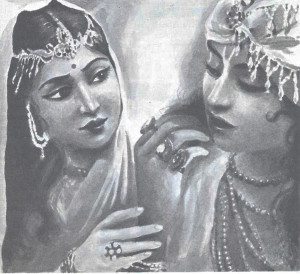 Lord Krsna talked a long time with His friend Sudama. Then, just to enjoy His friend’s company, He began to smile and asked, “My dear friend, what have you brought for Me? Has your wife given you some nice eatables?”
Lord Krsna talked a long time with His friend Sudama. Then, just to enjoy His friend’s company, He began to smile and asked, “My dear friend, what have you brought for Me? Has your wife given you some nice eatables?”
Sudama hesitated out of shyness to bring forth the chipped rice. The Lord assured him that He was in need of nothing, but that He would gladly accept any offering given in love.
“How can I offer such an insignificant thing?” thought Sudama. But the Lord knew his heart. He knew very well, since He is situated in everyone’s heart, that the brahmana had come to see Him on the instigation of his wife to get some material opulence. Moreover, He knew fully well that Sudama’s love for Him was not tainted by any desire for material benefit. Krsna then decided He would very lavishly award Sudama.
“What is this?” Lord Krsna snatched the bundle of chipped rice, which was tucked in a corner of Sudama’s shoulder pack. “Oh My dear friend,” Krsna went on enthusiastically, “you’ve brought Me such nice palatable chipped rice. It will please not only Me but the whole creation.” It is understood from this statement that Krsna, being the original source of everything, is the root of the entire creation. As watering the root of a tree immediately distributes water to every part of the tree, so an offering made to Krsna or any action done for Krsna is to be considered the highest welfare work for everyone. The benefit of such an offering is distributed throughout the creation.
While speaking in this way, Lord Krsna ate a morsel of the rice, but when He attempted to eat a second morsel, Rukmini, the goddess of fortune, checked the Lord by taking hold of His hand.
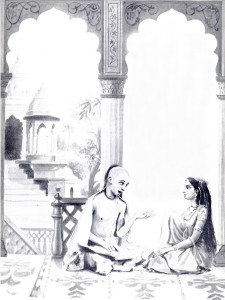 “My dear Lord,” she said, “by Your taking this one piece of rice Sudama will become wealthy not only in this life but in the next. You are so kind that this one morsel of rice is enough to cause him who offered it to become very opulent in this life and continue as such in the next.” Rukmini, the goddess of fortune, was already personally obliged to stay as a guest in the brahmana’s house in order to benedict him with great fortune.
“My dear Lord,” she said, “by Your taking this one piece of rice Sudama will become wealthy not only in this life but in the next. You are so kind that this one morsel of rice is enough to cause him who offered it to become very opulent in this life and continue as such in the next.” Rukmini, the goddess of fortune, was already personally obliged to stay as a guest in the brahmana’s house in order to benedict him with great fortune.
Sudama did not appear to have received anything from Krsna, nor did he ask anything; the whole time he was merged in an ocean of transcendental bliss. After taking rest that night in the palace, the next morning he started for his home. He was completely absorbed in remembering the dealings with the Lord, and he was happy to have seen Him.
On the way home he was filled with ecstatic reminiscences: “Krsna so respects the brahmanas that He embraced to his chest a poor brahmana like me. How can there be any comparison between me and the Supreme Lord Krsna, who is the only shelter of the goddess of fortune? He allowed me to sit on His bedstead, and when I was tired, Rukmini began to fan me. She never considered her exalted position. I was rendered service by the Supreme Personality of Godhead because of His high regard for the brahmanas, and by massaging my legs and feeding me with His own hand, He practically worshiped me! Yet the Lord was so kind to me that He did not give me even a penny, knowing very well that I am a poverty-stricken man who, if I got some money, might become puffed up and mad after material opulence and so forget Him.”
Thinking in this way, Sudama reached his home. But when he looked for his cottage he saw in its place a huge, gorgeous palace made of valuable stones and jewels and glittering like the sun.
“What is this?” he thought. “How am I seeing these changes? Does this palace belong to me or to someone else? Surely this is where I used to live—it is the same place—but how wonderfully it has changed!” Then one dazzling opulence and beauty after another was revealed to Sudama Brahmana. His old neighborhood had become transformed into an area of parks with nice lakes full of lotus flowers and lilies and flocks of multicolored birds. Beautiful men and women were strolling in the parks and musical chanters who looked like demigods came forward to greet him. On hearing of her husband’s arrival, the wife of the brahmana ran out of the palace to greet him. She appeared so beautiful that it seemed as if the goddess of fortune herself had come to meet him. The brahmana was surprised to see his wife so beautiful and so greatly affectionate, and without saying a word he entered the palace with her. His inner chambers were like the residence of the king of heaven. The palace was surrounded by many columns of jewels, rich canopies of velvet and silk hung in various places, and everything was opulent.
He could not determine what had caused the change, but then he began to consider: “I have always been poor—what could be the cause of this? It could only have come from the all-merciful glance of my friend, Lord Krsna. surely these things are the causeless mercy of my friend Krsna.” Sudama could understand that the Lord considered such an insignificant offering as a handful of chipped rice, offered in affection by His devotee, a great thing and that He had given him riches more wonderful than any seen on earth, or even possessed by the demigods in the heavenly planets.
Sudama then offered his prayers to Krsna, praying that he did not want any opulence. He prayed that all he wanted was that he might not forget to offer eternal service to Krsna. Whatever opulence he received from the Lord should not be used for his own extravagance but for the service of the Lord, and so he accepted everything that happened as prasadam (God’s mercy).
Anything which we receive from the Lord—any facility, wealth, fame, power or education—should thus be used for His service and not for our sense enjoyment. In that way, Sudama remained in opulent surroundings without detriment to his spiritual life, and his affection for Krsna increased day after day. He was made more aware of his friend at every moment and of the Lord’s mercy.
One may ask, “But how did the brahmana’s wealthy surroundings make him more conscious of Krsna? Why did Krsna award him with material things?”
The answer is found clearly in the Krsna Book narrative: “The brahmana accepted his newly acquired opulence, but he did so in a spirit of renunciation, unattached to sense gratification, and thus he lived very peacefully with his wife, enjoying all the facilities of opulence as prasadam (God’s mercy). He enjoyed varieties of foodstuffs by offering it to the Lord and then taking it as prasadam. Similarly, if by the grace of the Lord we get such opulences as material wealth, fame, power, education and beauty, it is our duty to consider that they are all gifts of the Lord and must be used for His service, not for our sense enjoyment. The learned brahmana remained in that position, and instead of deteriorating due to his great opulence, his love and affection for Lord Krsna increased day after day.
Material opulence can be the cause of degradation and also the cause of elevation, according to the purposes for which it is used. If opulence is used for sense gratification it is the cause of degradation, and if it is used for the service of the Lord it is the cause of elevation.
If money or wealth can be used in Krsna’s service, if it can be used to increase remembrance and revive love of Krsna, then it must be used. We cannot mistake Sudama’s motive. Even at the point of receiving riches he thought, “I do not want any opulence. I only desire not to forget His service. I simply wish to associate with His pure devotees.” Sudama was just as happy when he was very poor because he always engaged in the devotional service of the Lord.
Similarly, in the modern age, the great gosvami followers of Lord Caitanya, Rupa and Sanatana, were very highly placed wealthy government officials, but they gave up everything in order to follow Lord Caitanya’s Hare Krsna movement, and they lived as mendicants without even a dwelling place. Yet they became richer and richer thinking of Radha and Krsna and Krsna’s pure devotees, and they never lamented over having given up their wealth.
Rich or poor, the criterion for eternal happiness is to remember Krsna in any condition. The point is made, however, that if one does give something to Krsna, no matter how little it be, he will not be the loser! What the devotee actually offers to the Lord is not needed by the Lord, for He is self-sufficient. But if the devotee offers something to the Lord, it acts for his own interest because whatever a devotee offers to the Lord comes back in a quantity a million times greater than what was offered. Sudama gave a few grains of chipped rice, and in return he received heavenly opulence. As a pure devotee, Sudama was expert in accepting the wealth and using it as more facility for serving Krsna.
It is related that by his constant association with the Lord, Sudama had wiped away from his heart whatever contamination was remaining, and he was very shortly transferred to the eternal spiritual kingdom, which is the goal of all saintly persons in the perfectional stage of life. It is stated in the Krsna Book that whoever hears this history will become qualified like Sudama and will be transferred to the spiritual kingdom of Lord Krsna.

How can I buy Black and white picture of Sri Krishna and Sudama